Embarking on a new romantic journey is undeniably exhilarating, filled with the promise of shared moments, laughter, and the potential for profound connection. However, nestled within the folds of this anticipation lies a complex emotion that many can attest to – new relationship anxiety. Have you ever found yourself asking, “Why am I scared of relationships?” I vividly recall a time when the thrill of a budding romance was overshadowed by an unexpected unease and I kept asking myself, “Why do I feel uneasy about my relationship?” This encounter with new relationship anxiety caught me off guard, revealing that anxiety and love go hand in hand when it comes to the dawn of a fresh chapter in one’s love life.
The distinctive nuance of new relationship anxiety stems from a delicate blend of excitement and trepidation, as we navigate uncharted territories of emotions and expectations. It’s a unique emotional state that teeters between the excitement of infatuation and the fear of potential vulnerabilities. In sharing my personal experience, I aim to unravel the signs, delve into the causes, and explore effective strategies that can help you handle new relationship anxiety with grace and understanding.
What Is New Relationship Anxiety?
Table of Contents
New relationship anxiety, often described as the anxiety in new relationship or the apprehension and unease one feels in the early stages of a romantic connection, encapsulates the anxiety over new relationship and the accompanying emotions. It’s the jittery sensation that arises when contemplating the unknowns of a budding love connection.
It encompasses anxiety about a new relationship and the fear of vulnerability that naturally accompanies such situations. The early relationship jitters can manifest as a blend of excitement and nervousness, creating a unique emotional cocktail that many individuals experience as they embark on a new romantic journey. It is also referred to as part of what is known as ‘new relationship energy’ or NRE.
If you’ve ever asked yourself, “Why do I have relationship anxiety?”, rest assured that experiencing relationship anxiety is perfectly normal, and it’s crucial to recognize that these feelings are a part of the intricate dance of forming connections. But dating with anxiety becomes a challenge if it turns too complicated.
Attachment anxiety, a common aspect of anxiety in new relationship, may surface as individuals grapple with the fear of rejection or the uncertainty of reciprocated feelings. While these emotions may initially seem overwhelming, advice for new relationships often emphasizes that acknowledging and addressing these concerns can create more secure and fulfilling connections. In essence, understanding that new relationship anxiety is a perfectly normal facet of the early stages of love is the first step toward navigating it with grace and building a foundation for a healthy, enduring bond.
Related Reading: What Is Texting Anxiety And How To Rein It In?
How long does early relationship anxiety last?
The duration of early relationship jitters can vary widely among individuals and is influenced by various factors. There isn’t a specific timeline that universally defines how long it lasts. For some people, new relationship anxiety may subside relatively quickly as they become more comfortable with their partner and the relationship progresses.
Others may experience lingering anxiety for a more extended period, asking themselves, “Why do I feel uneasy about my relationship?” over and over again. This happens especially if they have underlying attachment issues or past trauma, adverse childhood experiences in particular. So, how long does early relationship anxiety last? Factors that can affect the duration of early relationship anxiety include:
- Individual differences: People have different personalities, coping mechanisms, and attachment styles, which can impact how they navigate the uncertainties of a new relationship
- Communication: Open and honest communication between partners can contribute to resolving anxieties and building trust. Effective communication may expedite the process of overcoming anxiety over new relationship
- Past experiences: Individuals with past relationship trauma or attachment issues may find that their anxiety persists for a more extended period. Past experiences can influence how quickly someone is willing to trust and feel secure in a new relationship
- Relationship dynamics: The nature of the relationship itself, including how partners interact, support each other, and address challenges, can influence the duration of early relationship anxiety
One study on anxious partners, or people who were dating with anxiety, found that “Individuals who were traumatized rated both themselves and their partners as more neurotic and conflictual, even when controlling for overall levels of relationship satisfaction. However, the partners of traumatized persons do not consider themselves more neurotic or conflictual than partners in relationships where neither partner was abused.”
Related Reading: “My Anxiety Is Ruining My Relationship”: 6 Ways It Does And 5 Ways To Manage It
While it’s a normal part of the process to ask yourself, “Why do I have relationship anxiety?,” persistent, severe, and extreme relationship anxiety that interferes with daily functioning may indicate a more serious issue that could benefit from professional guidance. If someone finds that their early relationship anxiety is causing significant distress, seeking the support of a therapist or counselor can be beneficial in navigating these emotions and fostering a healthier connection.
Anxiety about a new relationship
Experiencing anxiety about a new relationship is a common phenomenon, and we can easily say that anxiety and love go hand in hand when it comes to a new romantic connection. The apprehension about a new relationship can be particularly pronounced for those with anxious attachment styles, where the fear of rejection in love or uncertainty about the new partner’s feelings may intensify these emotions. This interplay of emotions is a delicate aspect of mental health that many individuals navigate as they embark on the journey of forming connections. Here’s what one should keep in mind:
- Seeking relationship advice for new relationships is crucial for those grappling with the question, “Why do relationships give me anxiety?”
- Acknowledging and understanding anxious attachment styles can provide valuable insights into the root causes of relationship anxiety
- It’s essential to recognize that when you feel vulnerable, it is a natural part of opening up to a new partner, and addressing these emotions head-on can contribute to building a more secure and trusting connection
- Prioritizing mental health in the context of new romantic relationships involves fostering open communication, setting boundaries, and developing coping mechanisms to navigate the uncertainties that may trigger attachment anxiety
- By embracing vulnerability and seeking support, individuals can work toward building a foundation for a healthy and fulfilling relationship.
Related Reading: Gift Giving and New Relationships: How Much To Spend
Why do relationships give me anxiety at the beginning?
Experiencing relationship anxiety at the beginning of a new romantic journey is a complex interplay of past experiences, present moment dynamics, and the quest for a healthy relationship. “Why does liking someone give me anxiety?” Past relationships, especially those marked by challenges, may cast a shadow on the present, influencing why loving relationships give you anxiety. Anxious attachment styles, rooted in past emotional connections, can contribute to a heightened fear of vulnerability in new partnerships. Here are some reasons you may experience new relationship anxiety:
- Past relationships: Influence from previous romantic relationships may create apprehension, as past challenges can shape expectations and fears in new connections
- Anxious attachment styles: Individuals with anxious attachment styles may experience heightened insecurity, fearing abandonment in the early stages of a relationship
- Low self-esteem: Low self-worth can contribute to a negative self-perception, amplifying concerns about one’s worthiness of love and acceptance in a new partnership
- Anxiety about vulnerability: Fear of being emotionally vulnerable in intimate relationships may lead to anxiety, especially when faced with the prospect of opening up to a new partner
- Constant worrying: The tendency to constantly worry about the future of the relationship can create a perpetual state of anxiety, preventing the enjoyment of the present moment
- New partner dynamics: The unfamiliarity of a new partner’s communication style, preferences, and expectations can contribute to uncertainty, triggering relationship anxiety
Related Reading: Emotional Baggage – Causes, Signs, And Ways To Cope
In intimate relationships, the initial stages often trigger concerns about being the only person feeling this anxiety, leading to worries about how the new partner perceives you. These worries may stem from low self-esteem, a factor that plays a pivotal role in the overall mental health context. But does relationship anxiety go away? Well, overcoming anxiety in relationships involves not only understanding your anxious attachment styles but also cultivating self-esteem and seeking relationship advice to navigate potential pitfalls.
12 Signs You Are Dealing With New Relationship Anxiety
Now that we’ve answered the question, “Why does liking someone give me anxiety?”, we can look at the signs. Beginning a new romantic journey is undoubtedly filled with excitement, anticipation, and the promise of shared connection. However, for some, the initial stages of a relationship can be accompanied by a distinct and often overwhelming emotional challenge that goes way beyond NRE—new relationship anxiety.
Recognizing the signs of this anxiety is crucial for fostering a healthy and fulfilling connection. In this section, we delve into the subtle signs that suggest you are grappling with new relationship anxiety. From constant worrying to avoiding intimacy, understanding these signs of extreme relationship anxiety can pave the way for constructive self-reflection and proactive steps to overcome anxiety, fostering a more secure and loving bond with your partner.
Related Reading: The Complexities Of Modern Dating And How To Navigate Them: A Complete Guide
1. You’re constantly worrying about the future of the relationship
This sign involves persistent thoughts about the future of the relationship, leading you to worry excessively. Individuals experiencing constant worrying may find it challenging to stay focused in the present moment, as their minds are preoccupied with potential outcomes and uncertainties.
2. You overthink and overanalyze every little thing
One of the signs of anxiety in new relationship is overthinking in relationships, which manifests as a continuous loop of analyzing every aspect of the relationship. From interpreting text messages to scrutinizing interactions, overthinkers tend to create scenarios that may not align with reality, contributing to heightened stress and anxiety. A few such instances are:
- Overthinking the tone and content of text messages, searching for hidden meanings or potential signs of disinterest
- Analyzing the time it takes for a partner to respond, leading to concerns about their level of engagement in the relationship
- Overanalyzing social media interactions, such as likes, comments, or the frequency of posts, to gauge the partner’s feelings
- Constantly comparing the new relationship to past ones, fueling doubts and concerns about whether history will repeat itself
Related Reading: Mental Health Issues On The Rise – Identifying And Seeking Help
3. Your emotions are all over the place
Feeling like you’re on an emotional rollercoaster suggests that your emotional state fluctuates dramatically in response to various relationship dynamics. This can include intense highs during positive moments and deep lows when faced with challenges or uncertainties, negatively affecting relationship satisfaction.
4. You avoid emotional intimacy
An aversion to emotional intimacy may be indicative of an insecure attachment style. Those experiencing this sign may struggle to open up emotionally, making it difficult to form a deeper connection with their partner.
5. You’re stuck in an endless loop of negativity
Consistently harboring negative thoughts about the relationship can skew one’s perception of their romantic interest. These thoughts may focus on doubts, fears, or pessimistic views, potentially affecting the overall mood and dynamics of the relationship.
6. You have an avoidant attachment style
Individuals with avoidant attachment styles may exhibit emotional detachment in the relationship. This could include:
- A reluctance to engage in deep conversations
- A preference for independence
- A tendency to downplay the importance of emotional connection
Related Reading:10 Tips to Date When You Have Social Anxiety
7. You’re unwittingly sabotaging the relationship
Self-sabotage involves unconsciously undermining the relationship through behaviors that hinder its growth. This can manifest as:
- Creating unnecessary conflicts
- Withdrawing emotionally
- Engaging in actions that jeopardize the connection with the new partner

8. Your partner’s presence consistently triggers your anxiety
If you find yourself feeling anxious only when your partner is around, it may suggest unresolved issues from past relationships or struggles with anxious attachment styles. This emotional response can hinder the development of a secure and trusting bond.
9. You are scared to fully commit to the relationship
A fear of commitment or hesitancy to fully invest in a relationship with a new person may indicate commitment phobia. Individuals grappling with this relationship fear may struggle to envision a long-term future with their partner, creating obstacles to the relationship’s progress.
10. You cope in unhealthy or harmful ways
Coping mechanisms such as withdrawing, avoiding communication, or engaging in self-destructive behaviors can be signs that you’re struggling to cope with relationship anxiety. These actions may provide temporary relief but can have detrimental effects on the overall health of the partnership.
Related Reading: 11 Examples Of Self-Sabotaging Behaviors That Ruin Relationships
11. You find it hard to communicate honestly and openly
Difficulty in engaging in open and honest communication about feelings and concerns can hinder the development of a deeper connection. A reluctance to share thoughts and emotions may lead to misunderstandings and prevent the establishment of trust between romantic partners.
12. You zone out a lot when your partner is around
If you find yourself frequently zoning out when your partner is present, or feeling disconnected from your partner, it may be a subtle yet significant sign of new relationship anxiety. This disengagement can be a way of escaping overwhelming thoughts or emotions. This indicates the need to address underlying concerns, to foster a more present and connected relationship.
Related Reading: 15 Signs Of Emotional Detachment In Your Relationship
How To Cope With New Relationship Anxiety
Now that we know what new relationship anxiety is, the next burning question is: “Does relationship anxiety go away?” Yes, it does, even if it feels like it won’t. In overcoming new relationship anxiety, it’s crucial to focus on addressing just the things that contribute to your concerns, fostering a more mindful and intentional approach to building a lasting connection.
Coping with new relationship anxiety requires a combination of self-awareness, effective and open communication, and practical strategies to navigate the complexities of forming a connection. Here are some valuable tips on how to get over anxiety in relationships:
- Self-reflection: Take time to understand the root causes of your anxiety. Reflect on past experiences, attachment styles, and any patterns that may contribute to your feelings
- Open communication: Foster honest and open communication with your partner. Share your thoughts, concerns, and fears to build trust and create a supportive environment
- Set realistic expectations: Establish realistic expectations for the relationship. Understand that it’s normal to feel anxious in the beginning, and allow the connection to develop organically over time
- Mindfulness practices: Practice mindfulness techniques, such as meditation or deep breathing exercises, to stay grounded in the present moment and alleviate anxious thoughts about the future
- Establish boundaries: Set dating boundaries early in the relationship and communicate them to your current partner. Having a mutual understanding of each other’s needs and limits can create a sense of security
- Seek relationship advice: Consider seeking advice from friends, family, or a relationship counselor. External perspectives can offer insights and guidance on navigating the challenges of a new relationship
- Address past trauma: If past trauma contributes to your anxiety, consider addressing it through therapy. Working through unresolved issues can positively impact your current relationship
- Focus on self-care: Prioritize self-care to enhance your overall well-being. Engage in activities that bring you joy, reduce stress, and contribute to a positive mindset
- Challenge negative thoughts: Actively challenge and reframe negative thoughts. Replace self-doubt and catastrophic thinking with more realistic and positive perspectives
- Educate yourself: Learn about attachment styles and relationship dynamics. Understanding these concepts can provide valuable insights into your behavior and help you navigate the challenges of attachment anxiety
- Build a support system: Surround yourself with a supportive network of friends and family. Having a reliable support system can provide encouragement, reassurance, and a sense of connection outside of the romantic relationship
- Take small steps: Gradually expose yourself to situations that trigger anxiety, taking small steps to build confidence and comfort in the relationship
- Professional help: If anxiety persists and significantly impacts your well-being and mental health, consider seeking professional help. A therapist or counselor can provide tailored guidance and strategies to overcome relationship anxiety

To feel secure in a new relationship, focusing on the present moment is crucial. Instead of constantly worrying about past or future issues or wondering, “Why am I scared of relationships?”, one should build an emotional connection with one’s new partner. Overcoming dating anxiety is a journey that necessitates addressing relationship issues openly and honestly. This self-awareness and commitment to personal growth lays the foundation for a healthy relationship, where both partners can thrive, and anxiety can gradually give way to a sense of security and fulfillment.
Related Reading: 16 Pearls Of New Relationship Advice For Ladies By A Man
Remember that anxiety and love are two sides of the same coin in new relationships, and it’s a shared journey for both partners. By implementing these coping strategies on how to get over anxiety in relationships, you can navigate the initial stages of the relationship with greater resilience and create a foundation for a healthy and fulfilling connection.
Key Pointers
- New relationship anxiety is the experience of apprehension and unease that accompanies the excitement of a new love
- While some people get over this ‘dating with anxiety’ phase pretty quickly, others may not be so lucky due to factors like past experiences and attachment styles
- Overthinking, self-sabotage, and chronic negativity are a few signs that you might be experiencing new relationship anxiety
- Practicing mindfulness, challenging negative thoughts, and addressing your trauma can help you deal with new relationship anxiety
In navigating the intricate landscape of new relationship anxiety, it becomes evident that acknowledging and addressing these feelings are fundamental steps toward fostering a healthy and fulfilling connection. From self-reflection and open communication to mindfulness practices and professional support, the journey to overcome relationship anxiety is a personalized endeavor.
We hope you aren’t still wondering, “Why do I feel uneasy about my relationship?” Remember, recognizing that anxiety in the early stages of a relationship is a shared experience. People can implement these strategies to build trust, establish a secure emotional connection, and embrace the beauty of a developing partnership. As partners work together to navigate uncertainties and support each other’s growth, the challenges of new relationship anxiety can transform into opportunities for deeper understanding, better resilience, and a more enriching love story.
FAQs
Every person has early relationship anxiety thinking if they are doing everything right, if there is a future to the relationship, and things like that. But if this anxiety becomes overpowering it is not normal.
It is said you get comfortable even physically on the third date but it takes three months to put your guard down and show your vulnerability in a new relationship.
You first need to relax in the relationship and go with the flow. Ditch your insecurity, talk to your partner about how you feel, and try to divert yourself to hobbies and friends to get over the early relationship anxiety.
Falling in love does cause anxiety. If you look at our facts about love then you will see in the early stages of a relationship people do feel a certain level of stress. Research shows people show higher cortisol levels when they fall in love showing it creates some kind of anxiety.
Your contribution does not constitute a charitable donation. It will allow Bonobology to continue bringing you new and up-to-date information in our pursuit of helping anyone in the world to learn how to do anything.

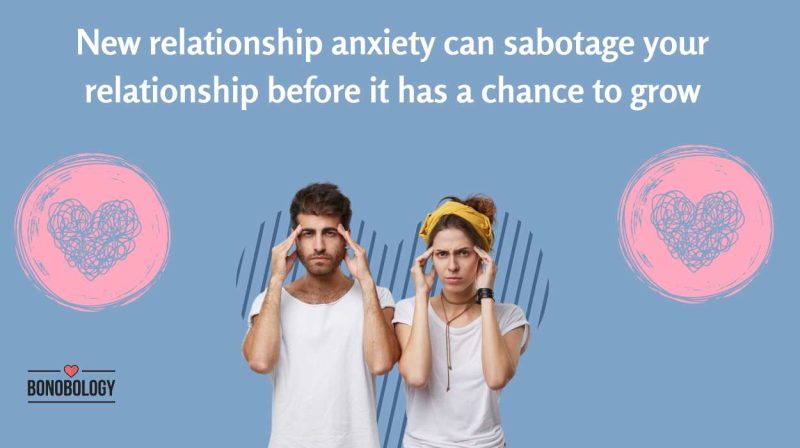


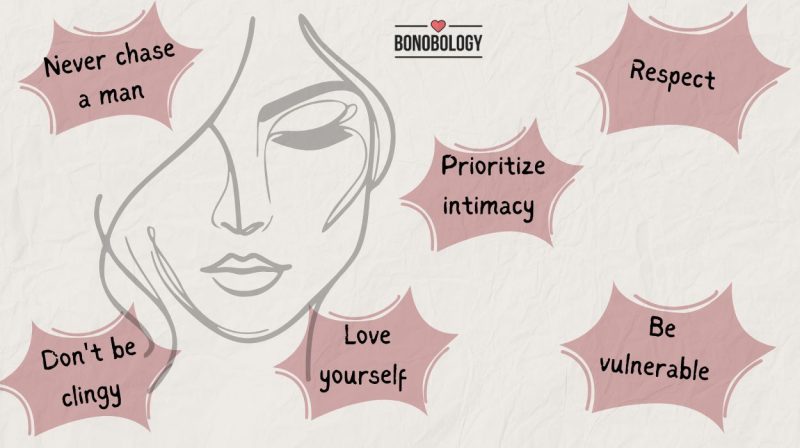

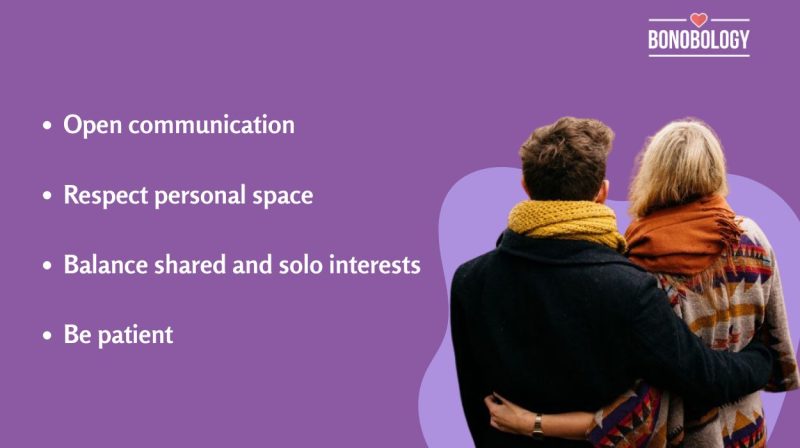

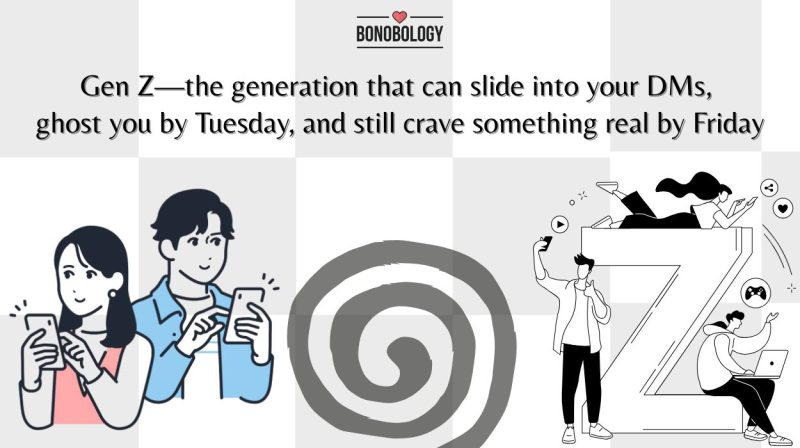


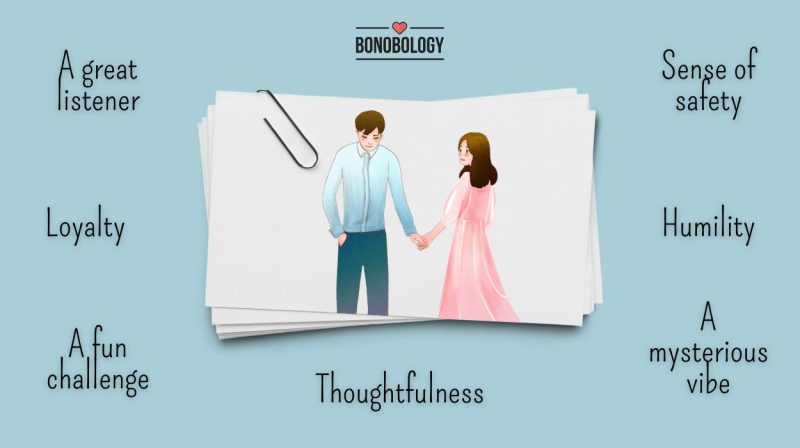
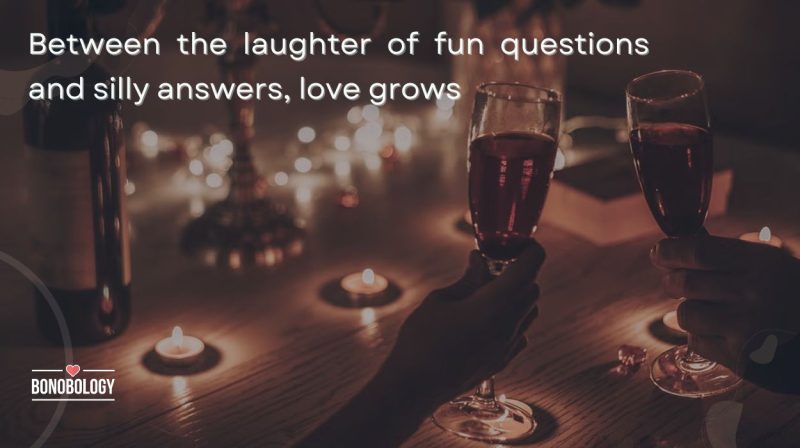
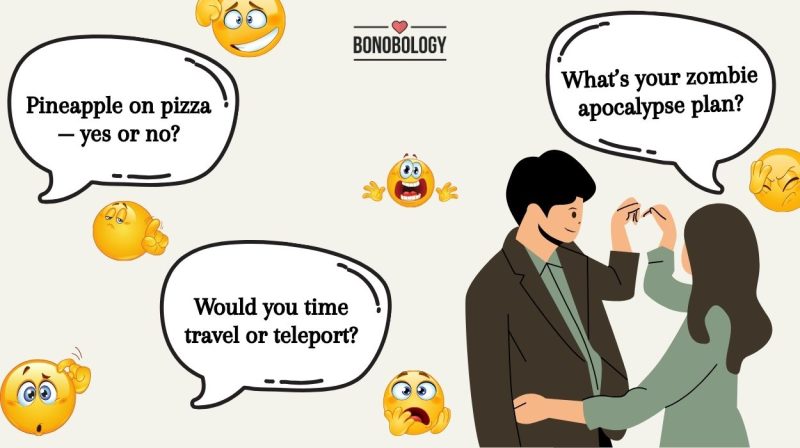
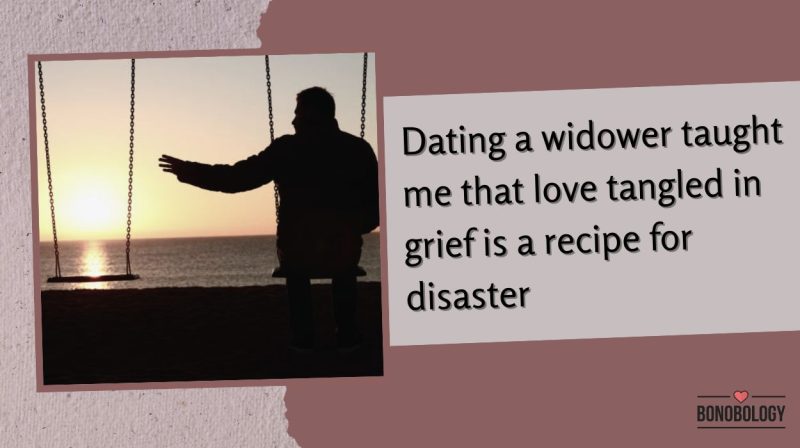
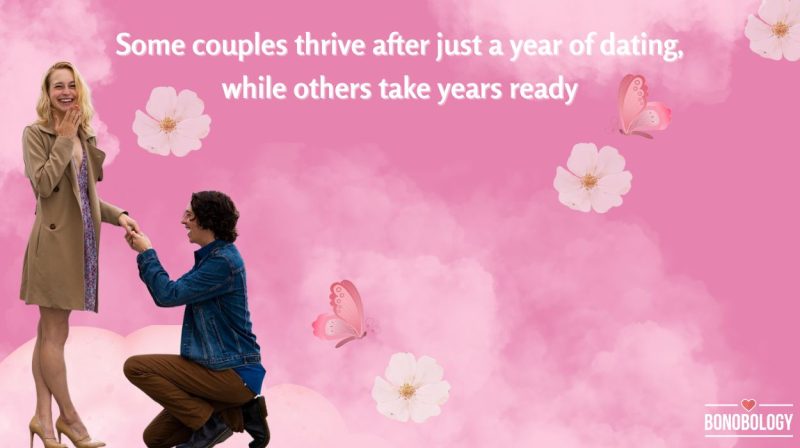
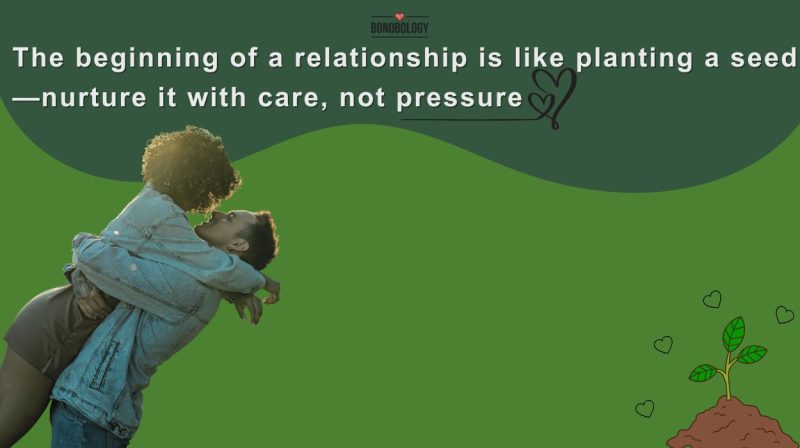
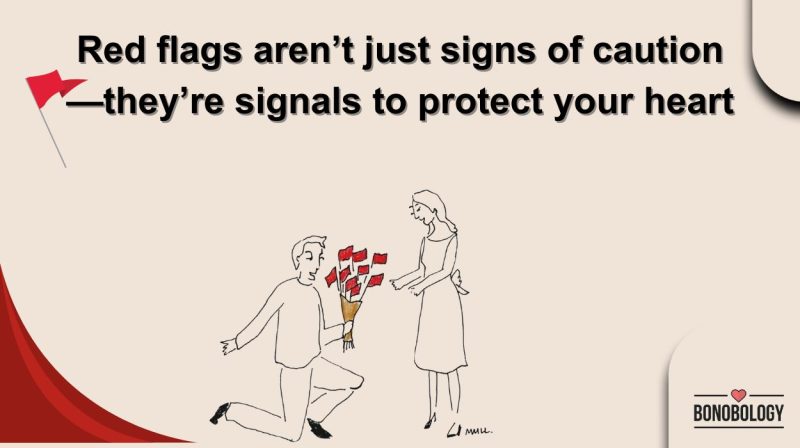

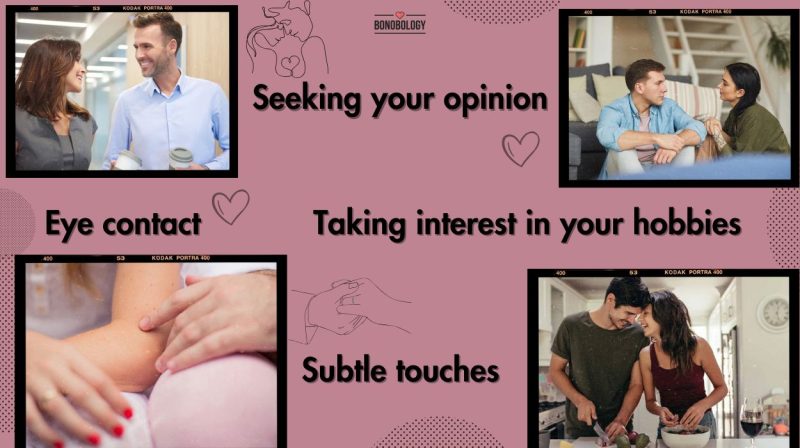
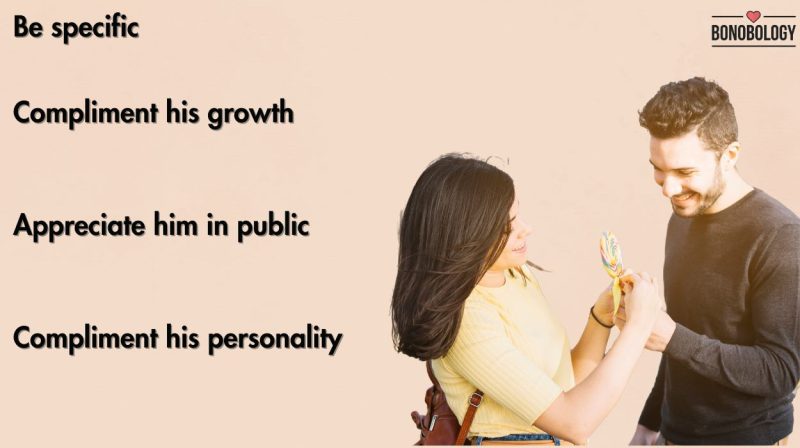
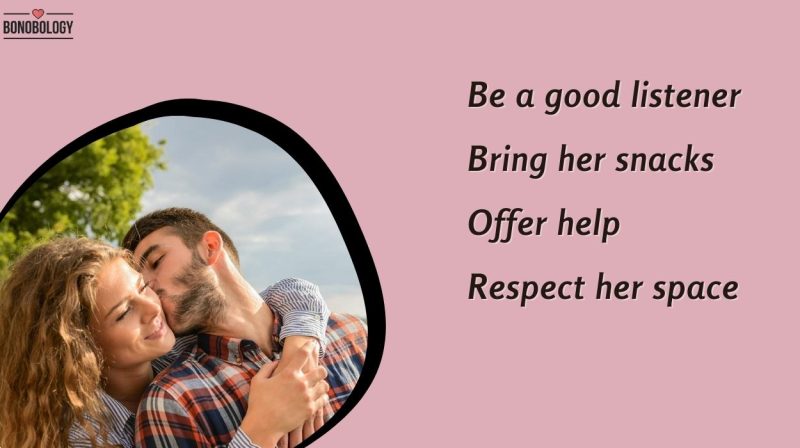
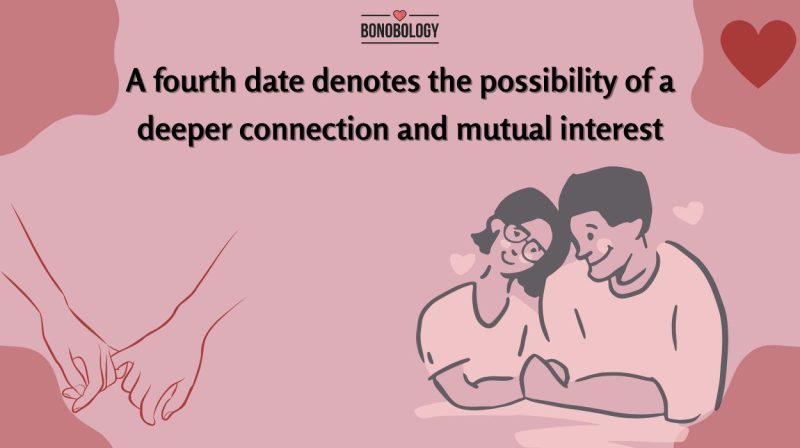
Featured
5 Communication Styles In Relationships: What They Mean & How To Use Them
21 Nuggets Of Relationship Advice For Women
What Is Simping And Is It A Red Flag In Guys?
Introvert Dating Introvert: A Complete Guide
Is He Shy Or Not Interested? 26 Ways To Tell The Difference
Gen Z Dating: Understanding and Navigating the Landscape
What Are Fun Dating Questions? 140 Playful, Flirty, and Deep Starters
Navigating Exclusivity In A Relationship: How To Do It Right
Do Girls Like Shy Guys? 7 Reasons They Do
101 Fun Date Night Questions To Laugh, Flirt, And Bond Over
161 Weird Questions To Ask Your Boyfriend And Get Him Talking
Why I Will Never Date A Widower Again -A Woman’s Story
How Long Should You Date Before Getting Engaged
Dating Guide: 9 Things To Never Do In The First Month Of Dating
11 Red Flags When Dating A Separated Man | Don’t Ignore These
152 Most Stupid Pickup Lines of All Time | AVOID THESE At All Costs
21 Clear Signs Of Unspoken Attraction Between Two People
How To Compliment A Guy: Tips And Examples
How To Comfort Your Girlfriend: 15 Simple Tips (With Examples)
Your Guide To Getting The Fourth Date Right